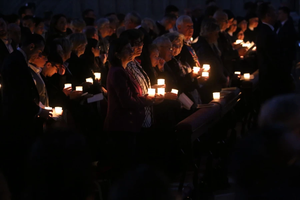80 Years Ago Today: The Heroic Last Battle of the USS Johnston
The lives of those who sacrificed for freedom on Oct. 25, 1944, summon us to integrate faith into action, following Christ’s example of heroic charity.

As Catholics, we are called to integrate our faith into every aspect of our daily lives. Our relationship with God and the teachings of Christ are not confined to the walls of a church or limited to specific moments of prayer. Rather, our faith is a living reality that must permeate every interaction, decision and endeavor. Whether we are priests, deacons, religious or laypeople, each of us has a unique vocation that invites us to embody Christ’s love and teachings in our own distinct way.
For those of us who serve as deacons, our role encompasses both visible and subtle aspects of ministry. We are called to participate in liturgical functions, preach the Word and engage in charitable works — these are the more apparent elements of our vocation. Yet, the true essence of our calling extends far beyond these formal duties. It involves reflecting Christ’s love and compassion in all that we do, not only within the confines of the Church but also in the ordinary circumstances of everyday life. Whether we are visiting the sick, comforting the grieving or simply being present to those in need, we are called to be living witnesses to the Gospel.
However, this call to integrate faith into daily life is not exclusive to deacons; it applies to every Catholic, regardless of their specific vocation or state in life. Each of us is invited to make our faith a lived reality, whether through formal roles such as teaching religious education, leading prayer groups or participating in community service. It will also involve demonstrating Christian virtues in the workplace, nurturing a loving and faith-filled family life, or showing compassion and understanding in our daily interactions with others.
An example of how faith can be integrated into everyday life through creative means is found in my historical novel, Battle in the Pacific. While I have written books on theology and spirituality, Battle in the Pacific marks my first literary attempt at creatively integrating my faith into the secular realm, reaching an entirely different audience.
At first glance, this book may appear to be a straightforward recounting of World War II events, but it is much more than that. Battle in the Pacific is a heartfelt tribute to the extraordinary sacrifices made by those who fought for the freedoms we cherish. It serves as a powerful reminder of the immense cost of freedom and the virtues of self-sacrifice, which resonate deeply with our Holy Catholic faith.
The novel tells the riveting true story of Commander Ernest Evans and the crew of the USS Johnston as they faced overwhelming odds during a critical naval battle. Their courage and tactical brilliance in the face of a vastly superior Japanese fleet highlight remarkable bravery and resilience. Beyond the dramatic portrayal of these historical events, the novel delves into timeless virtues that are central to our Christian life.
One of the most prominent virtues illustrated in Battle in the Pacific is the theme of sacrifice. Jesus teaches us that, “There is no greater love than to lay down one's life for a friend” (John 15:13). This principle is not just a guiding tenet for saints and martyrs but for all Christians. The characters in the novel, many of whom are based on real historical figures, vividly embody this ultimate act of love. They are individuals who risked their lives for their country, stood against tyranny at great personal risk, and bore immense burdens with unwavering resolve. Yet, the sacrifice extended beyond those who fought and died on the waters of the Pacific. It also includes the wives who lost their husbands and the children who grew up without their fathers. Their silent, enduring grief and the challenges they faced in rebuilding their lives are poignant reminders that the cost of freedom is borne by many, and that sacrifice often extends far beyond the front lines, touching the lives of countless others.
Writing Battle in the Pacific was more than a creative endeavor; it was a deeply spiritual exercise. It allowed me to explore how ordinary individuals can achieve extraordinary things through acts of virtue and sacrifice — acts made possible by grace. This project became a form of catechesis, offering a way to teach and inspire readers about moral living through the power of storytelling. By weaving Christian virtues into the narrative, I aimed to provide readers with a tangible example of how faith can inform and transform even the most challenging situations.
Just as the heroes of Battle in the Pacific exemplify courage and self-giving, every Catholic is called to embody these virtues in their own lives. Our freedom, including the freedom to practice our faith, is a precious gift that comes at a cost. By recognizing and honoring this truth in our actions and decisions, we pay tribute to those who sacrificed for our freedoms and fulfill our own calling to serve Christ and his Church.
Ultimately, the message of integrating faith into every aspect of life is universal. Whether through formal roles within the Church or through personal endeavors like storytelling, each of us has a unique role in living out the Gospel. Battle in the Pacific stands as a testament to this principle, illustrating how all aspects of our lives can glorify God and communicate his saving love. As we reflect on the sacrifices of the past and the call to live out our faith, let us strive to embody Christ’s love in all that we do, honoring both our vocations and the legacy of those who came before us.
- Keywords:
- heroism
- world war ii
- uss johnston
- courage
- charity
- us navy
















